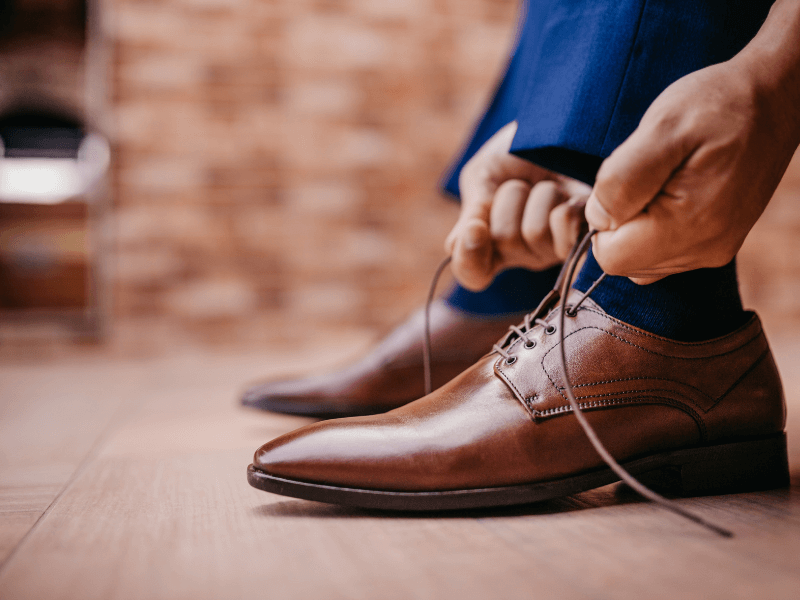You’ll almost certainly have specific shoes for work, whether your job requires specialist footwear (such as non-conductive electrical hazard boots) or not. But if you can’t wait to kick off your work shoes when you get home because your feet are tired, sore, or painful, they could well be causing short-term or long-term damage instead of providing protection, support, and comfort. In this article, we’ll explain how to spot the signs of foot problems linked to unsuitable work shoes and select footwear that works better for you.
Work shoes are arguably the most important shoes you own, especially if you’re on your feet all day as a nurse, hotel porter, waiter/waitress or London tour guide, say. In the UK, people typically work 43 hours per week. If your feet are encased in ill-fitting, poorly designed footwear for long hours, your ability to get to work and do your job will be impaired. Research published by the Occupational Medicine journal found 11.5% of musculoskeletal-related absences from work lasting up to a week were due to foot/leg problems.
At our podiatry clinics in The City EC2 and other London locations, we often treat patients who’ve found the shoes they wear in offices, restaurants, shops and other workplaces aren’t up to the job. So if you’re experiencing work shoe woes, simply contact us for professional foot care.
Signs You’re Wearing the Wrong Work Shoes
If your work shoes damage your feet, you may develop the following foot problems:
- Sores and blisters suggest work shoes are too loose (and so chafe the skin) or too tight (and so put pressure on it). These wounds easily get infected.
- Calluses and corns – thickened skin may appear on pressure points if work shoes squeeze feet or aren’t well cushioned. The latter issue can also cause foot fatigue.
- Toe pain – wearing slip-on shoes can give you cramp as your toes grip them tightly. Narrow, pointed shoes can also lead to toe pain, as well as poor circulation and ingrown toenails. They can exert enough pressure to force joints out of alignment, leading to toe deformities, including bunions.
- Pain in the balls of the feet – high heels are often to blame, as they force people to place too much weight on these areas.
- Aching arches suggest you’ve developed strained ligaments because your work footwear offers insufficient arch support. Common culprits include flat, thin-soled shoes, such as flimsy sandals.
- Sharp heel pain may well mean the shock-absorbing plantar fascia tissue along the bottom of your feet has become inflamed due to unsupportive footwear.
- Wobbly gait – if you’re unsteady, your work shoes’ heel counters aren’t firm and stable enough. For example, stilettoes ‘can make you wobble like you’re walking on stilts’, remarks WebMD. Slippery soles also contribute to unsteadiness.
- Foot odour suggests work shoes stop sweat evaporating, leading to a build-up of bacteria.
Choosing the Best Work Shoes for Your Needs
As podiatry experts, we know that finding the right work shoes is crucial. They need to facilitate movement and allow for normal swelling as the day wears on. (Your feet may be up to half a size bigger by the time you get home.)
Proper cushioning and support are required to reduce the physical impact of walking on hard/uneven surfaces. Work shoes should also stabilise your feet and ankles, fasten securely, offer ventilation and last for up to a year.
With all this in mind, here are the key qualities to look for when choosing footwear for work:
- A range of sizes (including half-sizes) and widths to ensure shoes fit perfectly. Always use a measuring service
- Roomy toe boxes – toes need to spread out, especially when walking.
- Sufficient arch support and cushioning to ensure feet are comfortable and put a spring in your step!
- Stable heel counters that are just roomy enough to allow you to push your finger between your heels and the shoes’ heels. They should be complemented by sturdy ankle support.
- Flexible soles with deep treads and heels less than two inches high to make walking safer.
- Adjustable, secure fastenings such as shoelaces and buckles.
- Durable, breathable materials – leather and suede are smart choices.
Overcome Work Footwear Problems with Our London Podiatrists
If your work shoes have damaged your feet, our London podiatry services can help:
- Biomechanical assessments, including gait analysis, reveal abnormalities with patients’ lower limbs and mobility issues.
- Prescription orthotics correct abnormalities and offer enhanced support.
- Effective foot treatments banish corns, ingrown toenails and other problems.
- Tailored footwear advice helps patients to prevent further damage.
Work shoes causing foot problems? Book an appointment with Feet By Pody today for first-class foot care.

